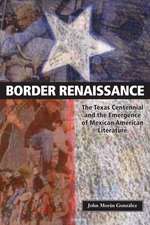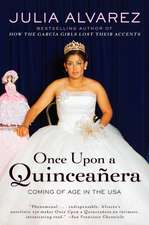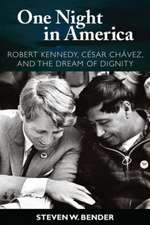¿Qué Onda?: Urban Youth Culture and Border Identity
Autor Cynthia Bejaranoen Limba Engleză Paperback – 6 sep 2007
Angel was born in Arizona and is part of the in-crowd. She likes clubbing, dancing, and going to car shows. Betzayra is from Mexico City and, despite polio-related disabilities, is the confident group leader of the Mexican girls. Arturo is also from Mexico City; he dresses more fashionably than most other boys and is taunted by the Chicanos. Evelyn was born in Arizona, but her mother was from Mexico and she hangs out with Mexican kids because she thinks they’re nicer than Chicanos. How these and some two dozen other young Latinas and Latinos interact forms the basis of a penetrating new study of identity formation among Mexican-origin border youths, taking readers directly into their world to reveal the labyrinth they navigate to shape their identities.
For Latina/o adolescents who already find life challenging, the borderland is a place that presents continual affirmations of and contradictions about identity—questions of who is more Mexican than American or vice versa. This book analyzes the construction of Mexicana/o and Chicana/o identities through a four-year ethnographic study in a representative American high school. It reveals how identity politics impacts young people’s forms of communication and the cultural spaces they occupy in the school setting. By showing how identities are created and directly influenced by the complexities of geopolitics and sociocultural influences, it stresses the largely unexplored divisions among youths whose identities are located along a wide continuum of “Mexicanness.”
Through in-depth interviews and focus groups with both Mexicana/o and Chicana/o students, Cynthia Bejarano explores such topics as the creation of distinct styles that reinforce differences between the two groups; the use of language to further distinguish themselves from one another; and social stratification perpetuated by internal colonialism and the “Othering” process. These and other issues are shown to complicate how Latinas/os ethnically identify as Mexicanas/os or Chicanas/os and help explain how they get to this point.
In contrast to research that views identity as a reflection of immigration or educational experiences, this study embraces border theory to frame the complex and conflicted relations of adolescents as a result of their identity-making processes. This intimate glimpse into their lives provides valuable information about the diversity among youths and their constant efforts to create, define, and shape their identities according to cultural and social structures.
For Latina/o adolescents who already find life challenging, the borderland is a place that presents continual affirmations of and contradictions about identity—questions of who is more Mexican than American or vice versa. This book analyzes the construction of Mexicana/o and Chicana/o identities through a four-year ethnographic study in a representative American high school. It reveals how identity politics impacts young people’s forms of communication and the cultural spaces they occupy in the school setting. By showing how identities are created and directly influenced by the complexities of geopolitics and sociocultural influences, it stresses the largely unexplored divisions among youths whose identities are located along a wide continuum of “Mexicanness.”
Through in-depth interviews and focus groups with both Mexicana/o and Chicana/o students, Cynthia Bejarano explores such topics as the creation of distinct styles that reinforce differences between the two groups; the use of language to further distinguish themselves from one another; and social stratification perpetuated by internal colonialism and the “Othering” process. These and other issues are shown to complicate how Latinas/os ethnically identify as Mexicanas/os or Chicanas/os and help explain how they get to this point.
In contrast to research that views identity as a reflection of immigration or educational experiences, this study embraces border theory to frame the complex and conflicted relations of adolescents as a result of their identity-making processes. This intimate glimpse into their lives provides valuable information about the diversity among youths and their constant efforts to create, define, and shape their identities according to cultural and social structures.
Preț: 199.67 lei
Nou
Puncte Express: 300
Preț estimativ în valută:
38.21€ • 40.86$ • 31.86£
38.21€ • 40.86$ • 31.86£
Carte tipărită la comandă
Livrare economică 17 aprilie-01 mai
Preluare comenzi: 021 569.72.76
Specificații
ISBN-13: 9780816526864
ISBN-10: 0816526869
Pagini: 258
Dimensiuni: 152 x 229 x 15 mm
Greutate: 0.37 kg
Ediția:1
Editura: University of Arizona Press
Colecția University of Arizona Press
ISBN-10: 0816526869
Pagini: 258
Dimensiuni: 152 x 229 x 15 mm
Greutate: 0.37 kg
Ediția:1
Editura: University of Arizona Press
Colecția University of Arizona Press
Notă biografică
Cynthia L. Bejarano is an assistant professor of criminal justice at New Mexico State University, where she directs a federal program assisting migrant and seasonal farmworker children to attend the university. She is also the co-founder of Amigos de las Mujeres de Juarez, an NGO dedicated to assisting the women of Juarez and Chihuahua City in their fight for justice.
Cuprins
Preface and Acknowledgments
Cast of Characters
1. Buscando la Identidad: Conceptualizing What It Means To Be Mexicana/o and Chicana/o
2. Stepping Stones: Revisiting Research on Immigrant Youth and Native Minorities
3. Youths of Mexican Descent: Falling between the Cracks, Falling into the Frontera Abyss
4. Escuchando las Voces de la Juventud, Listening to Youths' Voices
5. Latina/o Youth Cultures; The Crossroads of Collisions of Color, Customs, and Style
6. Serpent Tongues, Social Hierarchies, and National Citizenship:The Splitting of Border Languages and Cultures between Latina/o Youths
7.Discussion and Conclusion: Negotiating the Middle Spaces of Mexicanness and Other Possibilities
Appendixes
Notes
References
Index
Cast of Characters
1. Buscando la Identidad: Conceptualizing What It Means To Be Mexicana/o and Chicana/o
2. Stepping Stones: Revisiting Research on Immigrant Youth and Native Minorities
3. Youths of Mexican Descent: Falling between the Cracks, Falling into the Frontera Abyss
4. Escuchando las Voces de la Juventud, Listening to Youths' Voices
5. Latina/o Youth Cultures; The Crossroads of Collisions of Color, Customs, and Style
6. Serpent Tongues, Social Hierarchies, and National Citizenship:The Splitting of Border Languages and Cultures between Latina/o Youths
7.Discussion and Conclusion: Negotiating the Middle Spaces of Mexicanness and Other Possibilities
Appendixes
Notes
References
Index
Recenzii
"The literature on borderland theories and Chicana/o education has advanced, but the studies are still few and far between. This is the only book that deals with both Chicana/o and Mexican youth, with a sophisticated theoretical perspective: border theory, cultural citizenship, and internal colonialism...An innovative approach to the field."—C. Alejandra Elenes, Arizona State University













